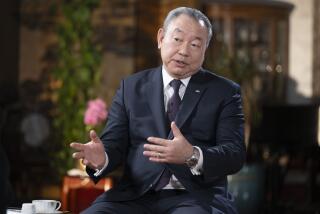China Envoys to Visit Taiwan
- Share via
BEIJING — High-level officials from China are to visit Taiwan today for the first time in six years, part of a string of recent small, conciliatory steps by the two longtime adversaries.
The Chinese delegation is technically a personal one rather than official. The officials will attend the funeral of Koo Chen-fu, Taiwan’s longtime top negotiator with the mainland who died of cancer in January. Koo was instrumental in bringing about a warming of relations in the early 1990s, when both sides agreed to disagree on the tricky issue of sovereignty for Taiwan, paving the way for talks.
Today’s visit follows the kickoff Saturday of direct cross-strait commercial flights, the first in 55 years. The charters are to continue through Feb. 20, allowing some of the more than 1 million Taiwanese living in China to travel home for the Chinese New Year holiday without stopping in Hong Kong, as had been required.
In another modest sign of reduced tension, the No. 4 official in China’s Communist Party hierarchy said last week that Beijing was ready to talk with Taiwanese President Chen Shui-bian or other officials provided that Taipei honored the idea that the two entities were “one China” and abandoned calls for Taiwanese independence.
Although those conditions are untenable for many Taiwanese, it was the first time Beijing has showed a willingness to deal with Chen.
Taiwan and the mainland have been estranged since 1949. China views the island as a rightful part of its territory and has threatened to use military force if it declares independence.
Taiwan offered its own opening recently by naming Hsieh Chang-ting, 58, as its next premier. The popular mayor of Kaohsiung immediately called for better relations with the mainland, an end to provocative language or policies in Taiwan and greater consistency, qualities that have been largely lacking since Chen was elected in 2000. Hsieh takes office today.
Still, analysts on both sides of the Taiwan Strait point out the many impediments to a significant breakthrough in relations. Beijing remains deeply distrustful of Chen, whom it sees as a provocateur intent on achieving Taiwanese independence.
Other potential problems include Taiwan’s proposed purchase of $18 billion in U.S. weapons, a possible end this year of a European Union ban on weapons sales to China, and Beijing’s threatened passage of an “anti-secession” law. Under that proposal, Beijing would create a framework for retaliation if Taiwan declared independence. Taiwan has threatened to draft an “anti-containment” law in response.
“The outlook is severe,” said Xu Bodong, head of the Taiwan Institute at Beijing Union University. “It will be like two trains colliding.”
For the time being, however, many are welcoming the respite from years of growing tension. The direct flights have garnered pages of newspaper coverage on both sides of the strait, with Beijing’s state-run China Daily touting the mainland’s extensive preparations.
China’s first charter flight was flown by Jin Yibin, who was former Chinese President Jiang Zemin’s pilot. And Xiamen Airlines, one of the carriers picked for the service, had its flight attendants speak Fujian dialect, widely used in Taiwan, and serve special Taiwanese dishes.
Koo’s funeral is also laden with symbolism. His face-saving way around the “one China” policy illustrates the creative thinking that would be necessary in any breakthrough.
Beijing’s official New China News Agency said two envoys who often dealt with Koo would be attending the funeral in a personal capacity, thereby avoiding cross-strait political complexities, thorny protocol issues and recognition problems.
Another diplomatic sensitivity was sidestepped by having the invitation come from Koo’s family rather than the Taiwanese government. But Chen is expected to attend.
More to Read
Sign up for Essential California
The most important California stories and recommendations in your inbox every morning.
You may occasionally receive promotional content from the Los Angeles Times.













